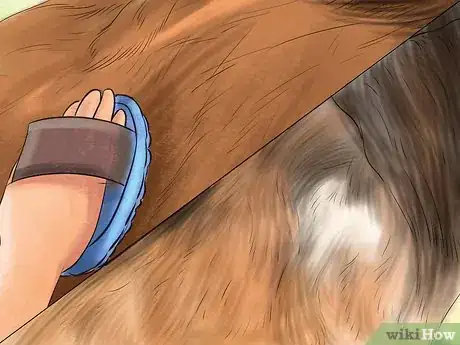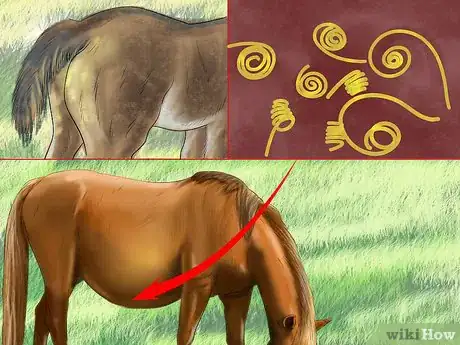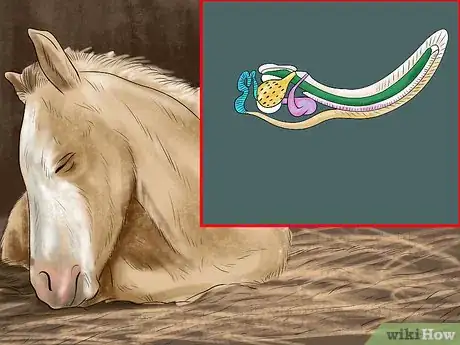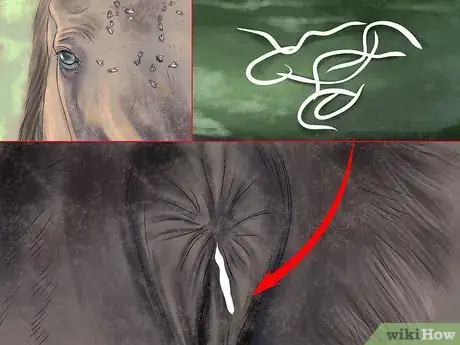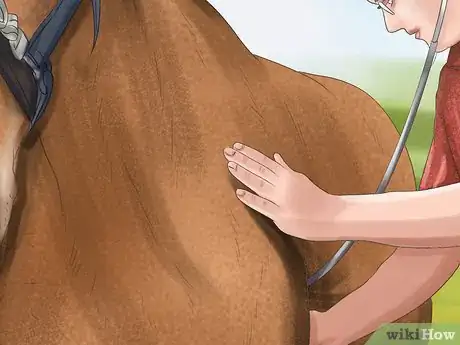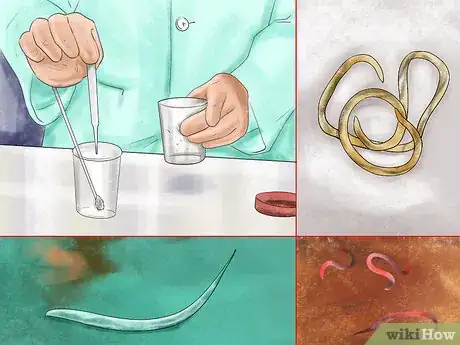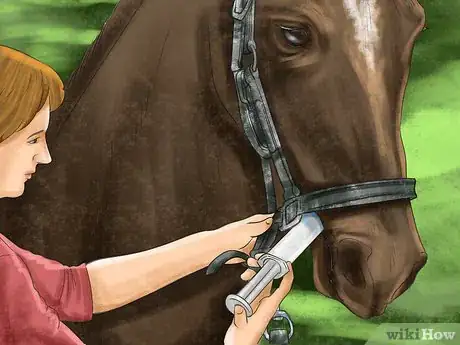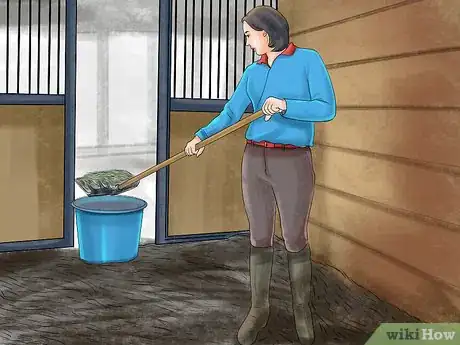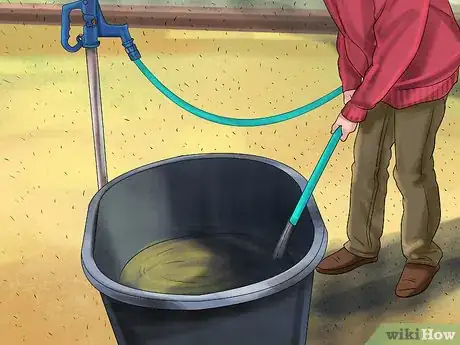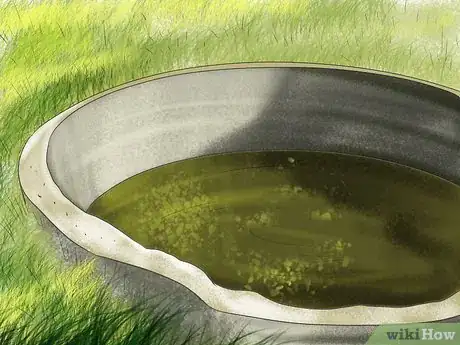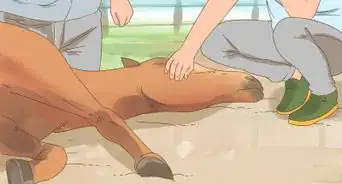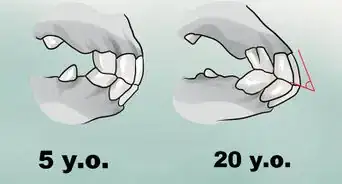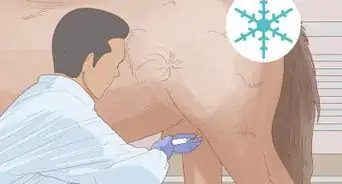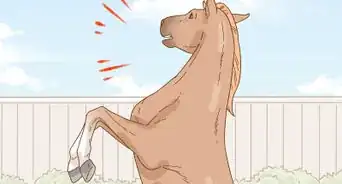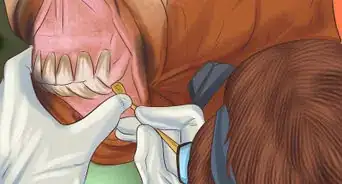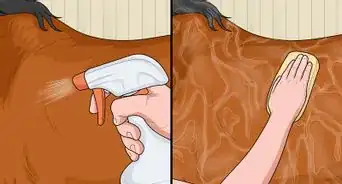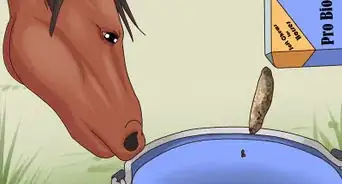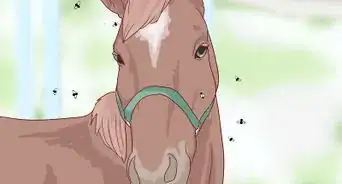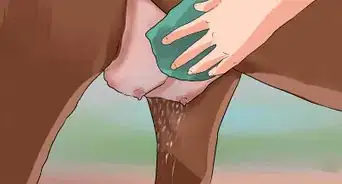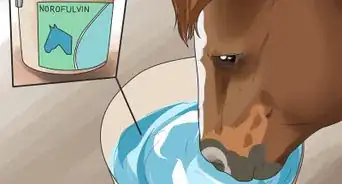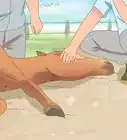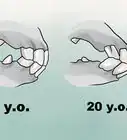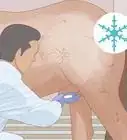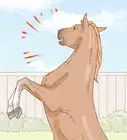This article was co-authored by Ryan Corrigan, LVT, VTS-EVN. Ryan Corrigan is a Licensed Veterinary Technician in California. She received her Bachelor of Science in Veterinary Technology from Purdue University in 2010. She is also a Member of the Academy of Equine Veterinary Nursing Technicians since 2011.
There are 7 references cited in this article, which can be found at the bottom of the page.
This article has been viewed 19,263 times.
Horses can get a variety of parasitic infections, both internally and externally. These infections are usually not life threatening but they can be uncomfortable for the horse and, in severe cases of neglect, can cause major health problems. While parasites can be uncomfortable for you to deal with, as a horse owner, it's your job to spot the signs of a problem. With early detection, your horse can get the veterinary treatment it needs to eliminate a parasitic infection.
Steps
Identifying the Signs of a Parasitic Infection
-
1Estimate your horse's weight. If your horse has become thinner than usual but is still eating steadily, the cause may parasites. Assess its weight and growth in comparison to its appetite. To assess your horse's weight, use a weight tape or a tape measure to figure out how much it weighs.
- To estimate a horse's weight, you will need to measure the girth of its heart and belly as well as its length from head to tail. Then use an online calculator to estimate its weight.[1]
- A horse with worms may have an enlarged stomach, even though it is losing weight. This is seen most often in horses younger than 1 year old. In very serious cases, this stomach enlargement may be visible on the outside of the horse.[2]
-
2Inspect the quality of your horse's coat. An unhealthy coat can be a sign that your horse has a parasitic infection.[3] Brush your horse as usual but pay close attention to the thickness and sheen of the coat all over your horse's body. This includes even the horse's belly and its legs. Is it as shiny as usual? Is the hair smooth or rough? Is it thinning in any areas? Negative changes may be a sign that your horse has parasites.
- A dull and drab coat could be caused by a parasite. This is because the parasites draw nutrition from the horse, giving it less than ideal conditions for a healthy coat.
Advertisement -
3Assess your horse's behavior and personality.[4] Look for changes in stamina and energy.[5] Parasites can really decrease your horse's energy. In addition, this decrease in energy, combined with acute discomfort, such as itching or pain, can cause your horse's personality to change.
- If your horse has suddenly become skittish or unfriendly, the change in personality may be due to illness.
-
4Look for signs of digestive illness. Internal parasites in horses often cause digestive problems, such as diarrhea. If your horse has not had any changes to its diet lately but has started having diarrhea, then the cause of new digestive problems could be parasites such as ascarids or threadworms.[6]
- Parasites can cause milder chronic, soft stools rather than just diarrhea. If your horse's bowel movements have changed with no obvious cause, contact your vet for a consultation.
-
5Pay attention to signs of respiratory trouble. An ascarid infection, which is a common parasitic infection in foals, can cause respiratory problems, as the larvae travel through the respiratory system.[7] If your foal is having a persistent cough or off-season cold, it may be caused by parasites.
-
6Look for actual parasites. Some parasites can be seen on the horse. This includes mainly external parasites but also includes internal parasites that exit the openings in the horse's body. Some parasites that can be seen on a horse's body include:[8]
- Pinworms: These are long, thin, and white larvae that can be seen on the anus of the horse. In addition to causing hair loss around the tail head, they can be seen when the females lay their eggs in the anal region of the horse. These eggs often look like grains of rice around your horse's anus.
- Bots: While bots develop in the stomachs of horses, their eggs are deposited on the outside of the horse, where the horse licks them due to irritation and then ingests them. Look for bot eggs all over the horse but they are usually deposited on the inside of the horses knees.[9] They are small white dots that show up in groups.
- Flies: These can be a real irritation to a horse, as the can bite and sting a horse.[10] If there are a lot of flies around your horse, then you should work to eliminate them on your horse and in your horse's area.
- Mosquitoes: Mosquitoes can be a nuisance for horses but they can also spread infections, such as encephalomyelitis and West Nile virus.[11] If there are a lot of mosquitoes in your horse's area, or you are seeing them bite your horse, then you need to work on eliminating them.
- Ticks: If you have taken your horse into areas that could have ticks, you should look your horse over afterword for any sign of the parasite. Ticks can give your horse anaplasmosis or lyme disease, which are both serious bacterial infections. Look for black dots on your horse, which may be swollen with blood. Use your fingertips to feel your horse's body for the small black parasites. You may need to part the hair slightly to examine the skin.
Getting a Veterinary Diagnosis of Internal Parasites
-
1Contact your veterinarian. If you suspect a parasitic infection, you should contact your veterinarian and discuss your concerns. The veterinarian will let you know if and when you should get the horse looked at.
- Many symptoms of parasites are also symptoms of other illnesses. For instance, weight loss or diarrhea can signal parasites or other illnesses. Thus, your veterinarian may not be able to pinpoint exactly what the problem is without examining the horse.
-
2Agree to a fecal testing. Most internal parasite infections can be identified with one of two fecal tests, fecal flotation and fecal egg count. The fecal egg count is done by looking for and counting the number of eggs in your horse's feces.[12] Fecal flotation allows a veterinarian to look at parasitic eggs through a microscope to identify what exactly they are. With these tests, the veterinarian can assess what type of infection, if any, your horse has, as well as how severe the infection is. Parasites that can be identified with these tests include:
- Large Strongyle (blood worms or red worms)
- Small Strongyle (cyathostomins)
- Roundworms (Ascarids)
- Bots
- Strongyloides
- Tapeworms
-
3Follow your veterinarian's suggestions for treatment. Many parasites are treated differently, so it's important to follow your veterinarian's suggestions to eliminate the specific parasite it has. This will usually include some sort of medication and suggestions for future care.
- Be sure to continue medication for as long as directed, so that the infection can be completely eliminated.
Treating a Parasitic Infection at Home
-
1Keep your horse's stall clean. There are some universal things you can do to minimize parasites in general and to help with the healing process. One of the most important of these is to keep a horse's area clean. This means cleaning the horse's stall daily, removing bedding and cleaning the entire surface.
- Be especially vigilant about removing manure, as this can promote parasitic larvae growth.
-
2Prevent fecal contamination of water and food. You do not want the horse to ingest any more parasites, which happens in many cases through the ingestion of contaminated food or water. In order to prevent this, you will need to keep manure out of eating areas.
- Clean eating areas and containers daily. Spray them down and make sure that they are totally clean and dry before refilling.
-
3Keep horses separated until the infection is eliminated. When treating one horse for parasites, you want to avoid spreading the infection to other horses. Keep the horse that is infected physically separated from other horses.
- Additionally, avoid cross contamination by keeping grooming tools and cleaning tools that you use on a contaminated horse separate from those you use on an uncontaminated horse.
-
4Eliminate parasite breeding grounds. Try to keep parasites out of your barn, stalls, or any areas close to you horse. For example, get rid of stagnant water in and around your horse stalls. The will keep mosquitoes from breeding in the area.
References
- ↑ http://www.thehorse.com/articles/31852/adult-horse-weight-calculator
- ↑ http://www.merckvetmanual.com/pethealth/horse_disorders_and_diseases/digestive_disorders_of_horses/gastrointestinal_parasites_of_horses.html
- ↑ http://www.aaep.org/info/horse-health?publication=876
- ↑ http://www.aaep.org/info/horse-health?publication=876
- ↑ http://www.aaep.org/info/horse-health?publication=876
- ↑ http://equusmagazine.com/article/internal-parasites-in-horses
- ↑ http://www.merckvetmanual.com/pethealth/horse_disorders_and_diseases/digestive_disorders_of_horses/gastrointestinal_parasites_of_horses.html
- ↑ http://www.merckvetmanual.com/pethealth/horse_disorders_and_diseases/digestive_disorders_of_horses/gastrointestinal_parasites_of_horses.html
- ↑ http://edis.ifas.ufl.edu/ig139
About This Article
To diagnose parasites in horses, start by watching for symptoms like weight loss, an unhealthy coat, changes in stamina and energy, diarrhea, and respiratory problems. If your horse is exhibiting these symptoms, it's important to contact your veterinarian for an evaluation as soon as possible. Your vet will probably want to conduct fecal testing to determine what kind of parasite your horse has. Once the parasite is identified, the correct medication can be prescribed. Be sure to continue administering the medication for as long as the vet suggests so that the infection can be completely eliminated! For tips from our Veterinary co-author on caring for your horse during treatment, read on!

